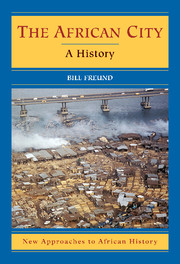Book contents
- Frontmatter
- Contents
- PREFACE
- 1 Urban Life Emerges in Africa
- 2 African Cities and the Emergence of a World Trading Economy
- 3 Colonialism and Urbanisation
- 4 Cities in Revolt: The Long-Term Crisis of South African Urbanism
- 5 The Post-Colonial African City
- 6 Globalisation and the African City: Touba, Abidjan, Durban
- INDEX
3 - Colonialism and Urbanisation
Published online by Cambridge University Press: 05 June 2012
- Frontmatter
- Contents
- PREFACE
- 1 Urban Life Emerges in Africa
- 2 African Cities and the Emergence of a World Trading Economy
- 3 Colonialism and Urbanisation
- 4 Cities in Revolt: The Long-Term Crisis of South African Urbanism
- 5 The Post-Colonial African City
- 6 Globalisation and the African City: Touba, Abidjan, Durban
- INDEX
Summary
In the previous chapter, we have noted that intensified participation in the Classical, Islamic, and then the expanding capitalist European world all led to urban growth in Africa, growth of a kind that was linked to a more general commercialisation of society. The towns that developed in consequence could be described as exploitative: they lived off trade and state formations that systematically extracted wealth from pastoralists and peasants, although they also engendered communities with distinctive skills, cultures, and ways of life. Urban growth continued under colonial occupation from the late nineteenth century but extended itself by leaps and bounds, particularly in the final generation of colonial rule beginning with World WarII. According to one estimate the percentage of Africans living in cities rose to 4.8 percent in 1920 and 14.2 percent in 1960. This meant impressive growth both in the size of cities (see Table 1) and in the extent of urbanisation taken as a whole; it also meant that the commercial vocation of cities in Africa became far more intense.
To this, we should probably introduce two important qualifications. On the one hand, not all urbanisation should be linked directly to commercial expansion. Some towns and cities developed as sites of capitalist production, particularly in the case of mining operations. As we shall see, the remarkable expansion of towns on the central African Copperbelt, in the colonies of Northern Rhodesia and the Belgian Congo, became a kind of benchmark for colonial African urbanisation more generally.
- Type
- Chapter
- Information
- The African CityA History, pp. 65 - 106Publisher: Cambridge University PressPrint publication year: 2007

